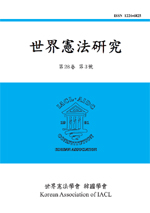미국령(U.S. Territory) 주민들의 연방 선거권
U.S. Territorial Residents’ Right to Vote for the Federal Representatives
- 세계헌법학회 한국학회
- 세계헌법연구
- 第28卷 第3號
-
2022.1299 - 130 (32 pages)
-
DOI : 10.24324/KIACL.2022.28.3.99
- 49

미국은 연방국가이며, 연방헌법은 연방정부와 주 정부의 권한을 배분한다. 연방헌법은 연방정부에 대한 주의 대표 역할을 수행하는 연방의원과 연방정부를 대표하는 대통령 및 부통령 선거에 있어서 그 선거권이 주에 전속한다는 점을 명시하였다. 이에 근거한 미국의 선거인단 제도는 미국 시민들이 연방에 앞서 각 주의 구성원임을 전제한다. 그런데 위 연방헌법 규정은 주가 아닌 미국령(U.S. Territory) 주민들이 연방 선거권에서 소외되는 결과를 낳았다. 즉, 괌, 푸에르토리코, 버진 아일랜드, 북마리아나제도, 사모아 등 미국령의 경우 어느 주에도 속하지 않고, 이에 따라 연방헌법에 명시된 주의 대표 선출권이 부여되지 않는다. 다른 주에 살다가 미국령으로 이사한 경우에도, 해당 미국령의 주민으로 편입된 이상 연방 선거권은 부여되지 않는다. 미국령의 주민들이 연방 선거권에서 배제된 데에는 연방대법원 및 연방・지방법원의 일련의 판결들이 결정적인 역할을 했다. 연방대법원은 미국이 주변국들로부터 영토를 확장하던 1900년대 초반 이른바 Insular 판례군(Insular Cases)을 통해 편입 독트린(Incorporation Doctrine)을 수립하고, 선거권은 미국 헌법 특유의 권리로서 구성원으로서의 편입 정도에 따라 부여 또는 부인될 수 있고, 이에 관한 연방의회의 결단에는 합리성 심사가 적용된다는 법리를 확립했다. 이후 선거권이 엄격심사의 대상이 되는 근본적 권리의 지위를 획득한 이후에도, 미국령 주민들의 선거권에 대하여만은 연방정부에 의해 부여된 특권이라는 해석이 유지되었다. 특히 재외국민 투표에 관한 법률인 UOCAVA는 미국령 중 일부는 ‘주’로 정의하여 이주민의 연방 선거권을 박탈하고, 일부 미국령은 사실상 외국으로 취급함으로써 오히려 이주민이 재외국민으로서 선거권을 행사하게 되는 입법적 흠결이 존재함에도 불구하고, 사법부가 위 법률의 합헌성을 인정함에 따라 미국령 이주자 간 이주지역에 따른 차별의 문제도 발생하게 되었다. 미국령 주민의 연방 선거권을 부정하는 것은 두 가지 차원에서 문제된다. 첫째, 선거권을 근본적 권리로 인정한 수정헌법 및 연방대법원의 판결과 선거권을 바라보는 관점을 완전히 달리한다는 점에서 연방헌법에 대한 해석권을 가진 사법부의 권위를 위협한다. 둘째, 미국령 주민들을 이등시민으로 취급함으로써 이들의 시민성을 부정하고 국가의 모든 구성원이 존중받는 정치적 환경을 조성해야 할 국가의 의무를 유기함으로써 공동체로서의 연방의 존립 근거를 위협한다.
The United States is a federal state, which means the Federal Constitution distributes legislative and executive power between the federal government and the state governments. In this regard, the Federal Constitution states that the right of election for the members of the House of Senate and the House of Representative, as well as the President and the Vice President is vested in each states. The electoral college system is a result of the constitutional determination, and its premise is the citizens of the United States are primarily the members of each states. However, this very design has created an alignation of the U.S. territory residents. Guam, Puerto Rico, Virgin Island, Northern Mariana Islands, Samoa, etc, are not states according to the Federal Constitution, therefore their residents are not subject to the right to vote for the federal representatives. Futhermore residents who were originally residents of a state but have moved to a U.S. territory are also deprived of such right, for they are no longer members of any state. The denial of the right to vote on federal level for the U.S. territory residents is largely supported by the decisions of the U.S. federal and district courts. The “Insular Cases” set up “Incorporation Doctrine”, which situated the right to vote as artificial or remedial right. Throughout the 20th century, the right to vote has clearly been considered as the fundamental right, yet the territorial residents’ right to vote for the federal representatives has taken as a privilege that can be neglected. Particularly, the issue of violation of equal protection on the matter of territorial residents who originally resided in a state, has consistently been ignored, as the courts overlooked the inherent legislative flaw of UOCAVA. The denial of the territorial residents’ right to vote for the federal representatives is problematic on two levels. For one, it contradicts the interpretation of the U.S Supreme Court on the right to vote, thus threatening its legitimacy. On another note, the territorial residents become repudiated as second class citizens, which leads to the negligence of the federal government’s duty to create an environment where all members are equally respected, posing questions on the relevance of the institution.
Ⅰ. 서론
Ⅱ. 미국 시민의 연방 선거권
Ⅲ. 미국령 주민들의 연방 선거권 문제
Ⅳ. 미국령 주민의 연방 선거권에 관한 사법부의 판단
Ⅴ. 평가
Ⅵ. 결론
(0)
(0)